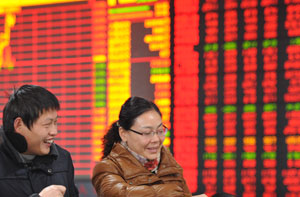

 The State Council announced recently that the policies and measures introduced to cool the housing market still have to be strictly followed.
The State Council announced recently that the policies and measures introduced to cool the housing market still have to be strictly followed.
 Since China's strategy of going global began in the late 1990s, its foreign direct investment has increased rapidly, attracting considerable attention from policymakers, academics and the public.
Since China's strategy of going global began in the late 1990s, its foreign direct investment has increased rapidly, attracting considerable attention from policymakers, academics and the public.
 When it comes to the Chinese economy, it seems that there are none so blind as they who will not see. For once again, hard facts last year got the better of those who are forever predicting doom.
When it comes to the Chinese economy, it seems that there are none so blind as they who will not see. For once again, hard facts last year got the better of those who are forever predicting doom.
 Each year late in January the World Economic Forum brings together leaders from business, government, academia and the media at its headquarters in Davos, Switzerland, to meet and engage in five days' of lectures and discussions about issues of global importance.
Each year late in January the World Economic Forum brings together leaders from business, government, academia and the media at its headquarters in Davos, Switzerland, to meet and engage in five days' of lectures and discussions about issues of global importance.
 Even though 2013 is well under way there remains considerable disagreement over the current and future state of the housing sector in China.
Even though 2013 is well under way there remains considerable disagreement over the current and future state of the housing sector in China.
 China's economy seems to be on a path of modest recovery, but its A-share market is one of the worst-performing equity markets in the world.
China's economy seems to be on a path of modest recovery, but its A-share market is one of the worst-performing equity markets in the world.
 How do economists assess China's opportunities in 2013 after studying the Central Economic Work Conference communique?
How do economists assess China's opportunities in 2013 after studying the Central Economic Work Conference communique?
 China's outward FDI rose almost 12 fold, from $5.5 billion a year to more than $65 billion a year from 2004 to 2011, inward FDI fell 0.2 percent in October from a year earlier to $8.3 billion, the 11th fall in 12 months.
China's outward FDI rose almost 12 fold, from $5.5 billion a year to more than $65 billion a year from 2004 to 2011, inward FDI fell 0.2 percent in October from a year earlier to $8.3 billion, the 11th fall in 12 months.
 China's blue economy is giving a new impetus to the marine and fisheries sector and providing the blueprint for China's sustainable development in the future.
China's blue economy is giving a new impetus to the marine and fisheries sector and providing the blueprint for China's sustainable development in the future.
 The internationalization of the renminbi requires a look at distant horizons as well as the local market.
The internationalization of the renminbi requires a look at distant horizons as well as the local market.
 The Chinese leadership should be more determined now than ever to implement the reform because the wealth gap has widened alarmingly.
The Chinese leadership should be more determined now than ever to implement the reform because the wealth gap has widened alarmingly.
 Employing more robots on the assembly lines is not helping to win OEM orders when the orders are being directed to equally cost-effective robotic factories.
Employing more robots on the assembly lines is not helping to win OEM orders when the orders are being directed to equally cost-effective robotic factories.